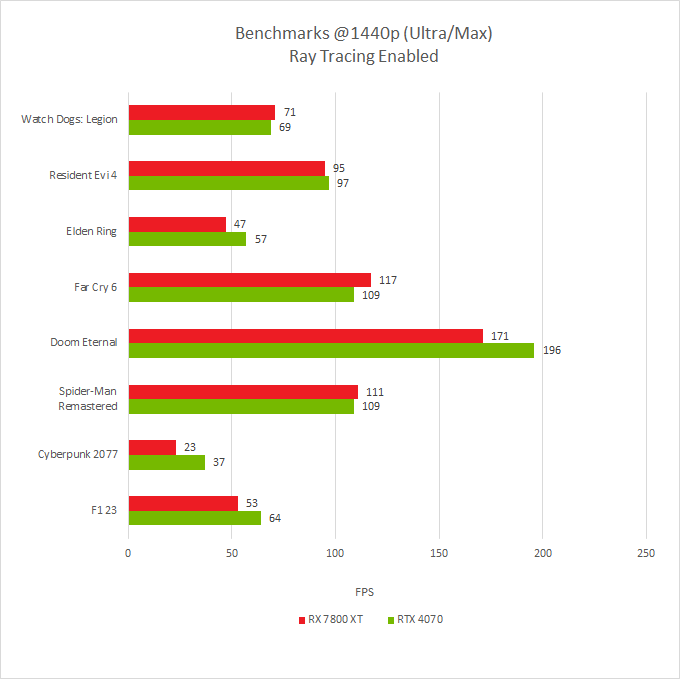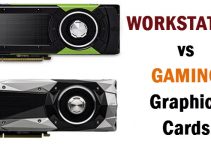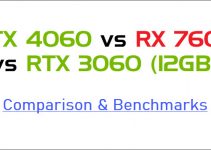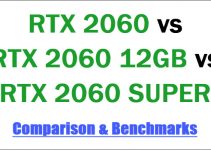After a long wait, the Radeon RX 7000 graphics card series from AMD has been expanded further with the launch of RX 7800 XT and RX 7700 XT graphics cards which are higher mid-range graphics cards and are mainly targeted for high FPS 1440p gaming. RX 7800 XT is the third card from the top in the RX 7000 series and is placed below the RX 7900 XT. The card comes with a completely new GPU chip but comes packed with all the features of its bigger brothers i.e. RX 7900 XT and RX 7900 XTX.
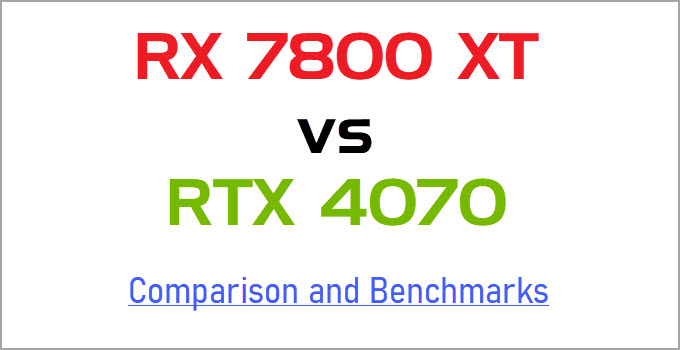
RX 7800 XTX is marketed as the ultimate 1440p gaming card from AMD but it has enough power to run the latest AAA games at 4K resolution with 60+ FPS. At 4K in some games, you may have to lower some of the intensive graphics settings to achieve higher frame rates for ultra-smooth gameplay. The main competitor of Radeon RX 7800 XT is the GeForce RTX 4070 from Nvidia which is also a very good higher mid-range graphics card. If you want to know which card suits you better for your gaming requirements then here, I will compare them based on important parameters, so that you can make an informed decision.
RX 7800 XT vs RTX 4070 Comparison
Below is the comparison between RX 7800 XT and RTX 4070 graphics cards based on their specifications, performance, pricing, power consumption, and features.
GPU Architecture
RX 7800 XT is built on the RDNA 3 GPU architecture. It uses a chiplet design, where the core GPU components reside on the Graphics Compute Die (GCD) in the middle and Memory Cache and controllers reside on Memory Cache Dies that surround the GCD. The GCD is built on the smaller 5nm fabrication process while MCDs are built on a 6nm manufacturing process. The card uses Navi 32 GPU Chip in its full glory and comes with 3840 Stream Processors, 60 Ray Accelerators, and 120 AI Accelerators.
On the other hand, RTX 4070 is built on Nvidia’s newest Ada Lovelace architecture on a smaller 5nm fabrication process. The card uses an AD104 GPU Chip and comes with 5888 CUDA Cores, 46 Ray Tracing (RT) Cores, and 184 Tensor Cores for processing AI-related tasks.
| RX 7800 XT | RTX 4070 | |
| GPU Chip | Navi 32 XT | AD104 |
| GPU Architecture | RDNA 3 | Ada Lovelace |
| Fabrication Process | 5nm | 5nm |
| CUDA Cores/Stream Processors | 3840 Stream Processors | 5888 CUDA Cores |
| Ray Tracing Cores | 60 | 46 |
| Tensor Cores | 120 | 184 |
Video Memory [VRAM]
RX 7800 XT comes with 16GB GDDR6 video memory having a 256-bit interface. The memory runs at a speed of 19.5 Gbps and delivers a memory bandwidth of 624 GB/s. RX 7800 XT also comes equipped with 64 MB Infinity Cache, an ultra-fast cache memory that helps to achieve a peak memory bandwidth of up to 2708 GB/s. On the other hand, RTX 4070 comes with 12GB GDDR6X video memory having a 192-bit interface. The memory runs at a speed of 21 Gbps and produces bandwidth of 504 GB/s which is significantly lower than that of RX 7800 XT.
| RX 7800 XT | RTX 4070 | |
| Memory Size | 16GB GDDR6 | 12GB GDDR6X |
| Memory Interface | 256-bit | 192-bit |
| Memory Speed | 19.5 Gbps | 21 Gbps |
| Memory Bandwidth | 624 GB/s | 504 GB/s |
| Infinity Cache | 64 MB | NA |
Features
Both RX 7800 XT and RTX 4070 are equipped with the latest features and support DirectX 12 Ultimate, OpenGL 4.6, Vulkan, PCI-Express 4.0, Real-Time Ray Tracing, HDMI 2.1, Resizable BAR, Microsoft DirectStorage API (to reduce game loading times), variable refresh rate technologies G-Sync/FreeSync, AV1 Hardware Encode/Decode. When it comes to image upscaling technologies in games to increase frame rates, RX 7800 XT supports FidelityFX Super Resolution (FSR) while RTX 4070 has DLSS (Deep Learning Super Sampling). RX 7800 XTX also supports DisplayPort 2.1 (8K 165Hz) which the RTX 4070 lacks.
| RX 7800 XT | RTX 4070 | |
| Bus Interface | PCI Express 4.0 | PCI Express 4.0 |
| DirectX | 12 Ultimate | 12 Ultimate |
| OpenGL | 4.6 | 4.6 |
| Vulkan | 1.2 | 1.2 |
| SLI/CrossFire | No | No |
| VR Ready | Yes | Yes |
| G-Sync/FreeSync | Yes | Yes |
| HDMI 2.1 | Yes | Yes |
| DisplayPort 2.1 | Yes | No |
| AV1 Support (Encode/Decode) | Yes | Yes |
| Real-Time Ray Tracing | Yes | Yes |
| Deep Learning Super Sampling/Fidelity FSR | FSR 3 | DLSR 3 |
Gaming Performance
Here are the gaming benchmarks of these cards at 1440p and 4K resolution.
1440p Gaming Benchmarks
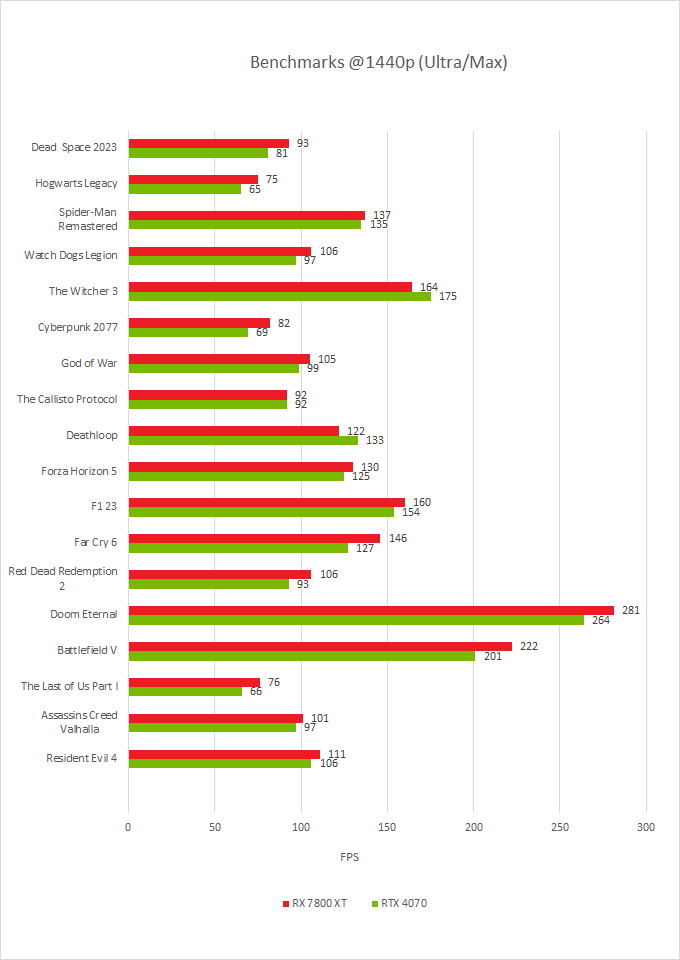 4K Gaming Benchmarks
4K Gaming Benchmarks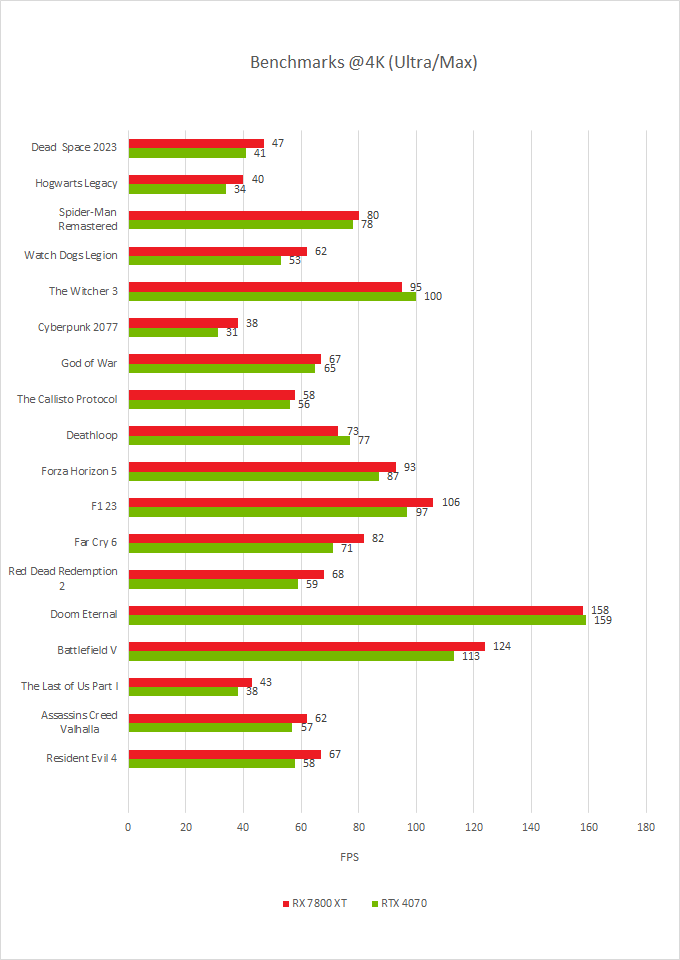 Ray Tracing Performance
Ray Tracing Performance
In the above gaming benchmarks, you can see that RX 7800 XT is slightly faster than RTX 4070 in almost all games. On average, RX 7800 XT is around 5% faster than RTX 4070 taking into account both 1440p and 4K resolution. However, when Ray Tracing is enabled in supported games then RTX 4070 takes the lead and is around 13% faster on average at 1440p & 4K resolutions.
Power Consumption
The power consumption of RTX 4070 is significantly lower than RX 7800 XT. RTX 4070 maximum power consumption is only 200W while that of RX 7800 XT is 263W.
| RX 7800 XT | RTX 4070 | |
| Power Consumption | 263W | 200W |
| Recommended PSU | 700W | 650W |
Pricing and Availability
The official MSRP of reference model RX 7800 XT is USD 499 while that of RTX 4070 is USD 599. The RTX 4070 is 100 US dollars expensive which is quite a significant margin. The custom models of these cards from different AIBs may cost more and you can check the pricing of various models from the links given below.
Check RX 7800 XT Price on Amazon
Check RTX 4070 Price on Amazon
RX 7800 XT vs RTX 4070 Specifications
| RX 7800 XT | RTX 4070 | |
| GPU Chip | Navi 32 XT | AD104 |
| GPU Architecture | RDNA 3 | Ada Lovelace |
| Fabrication Process | 5nm | 5nm |
| CUDA Cores/Stream Processors | 3840 Stream Processors | 5888 CUDA Cores |
| Ray Tracing Cores/Ray Accelerators | 60 | 46 |
| Tensor Cores/AI Accelerators | 120 | 184 |
| Memory Size | 16GB GDDR6 | 12GB GDDR6X |
| Memory Interface | 256-bit | 192-bit |
| Memory Speed | 19.5 Gbps | 21 Gbps |
| Memory Bandwidth | 624 GB/s | 504 GB/s |
| Bus Interface | PCI Express 4.0 | PCI Express 4.0 |
| DirectX | 12 Ultimate | 12 Ultimate |
| OpenGL | 4.6 | 4.6 |
| Vulkan | 1.2 | 1.2 |
| SLI/CrossFire | No | No |
| VR Ready | Yes | Yes |
| G-Sync/FreeSync | Yes | Yes |
| Power Consumption | 263W | 200W |
| Recommended PSU | 700W | 650W |
See also:
Final Thoughts
Well, RX 7800 XT is an excellent card in the 1440p gaming segment which is also capable of giving satisfactory 4K performance. It is only in the Ray Tracing department; the card slightly falls behind the RTX 4070. Also, the power consumption of RX 7800 XT is a little more than that of RTX 4070. Other than these two areas, RX 7800 XT is clearly better than RTX 4070 as it comes with an extra 4GB VRAM and also has significantly higher memory bandwidth. RX 7800 XT is also a lot cheaper compared to RTX 4070 and also supports DisplayPort 2.1. If you have any queries or want to express your views on this topic then do let me know in the comment section below.
(*This post may contain affiliate links, which means I may receive a small commission if you choose to purchase through the links I provide (at no extra cost to you). Thank you for supporting the work I put into this site!)
